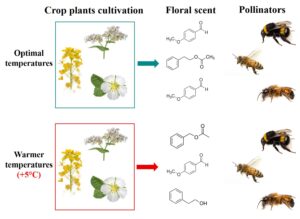Climate change impact on crop plant-pollinator communication
Environmental conditions are changing and the global mean surface temperature is projected to increase up to 5°C during the 21th century. Climate change is expected to undermine food security, since both crops and pollinators may be negatively affected. Floral scent is an important communication channel between plants and their pollinators, and changes in temperature impact flower scent emissions. However, the effects these changes in floral scent have on plant-pollinator interactions are still unknown. Our proposal will test for the first time whether shifts in floral emissions due to a temperature increase predicted by climate change scenarios affect the chemical communication between plants and their pollinators. Therefore, the objectives of this proposal are i) to analyze the flower scent of important crop plants at optimal growing temperatures and temperatures 5 °C higher; ii) to test whether different bee pollinators detect and behaviorally respond to potential changes in scent bouquet induced by an increase in temperature. We hypothesize that increased temperatures will induce an increase in the amount of scent and changes in relative composition of floral VOCs in the target crop species. These expected differences in scent patterns may have negative, neutral or positive effects on pollinator attraction. We selected buckwheat (Fagopyrum esculentum – Polygonaceae), oilseed rape (Brassica napus – Brasicaceae), and strawberry (Fragaria ananassa – Rosaceae) for our study as models, all of which worldwide crops used as human food and dependent on animal pollination. We will cultivate the crop plants in plant-growth chambers at two different temperatures. At these conditions, floral scents will be sampled by dynamic headspace and analyzed by gas chromatography coupled to mass spectrometry (GC/MS) to verify, if temperature increase by 5°C induces quantitative and qualitative changes in floral emissions. In parallel, we will perform electrophysiological tests by gas chromatography coupled to electroantennographic detection (GC/EAD) and behavioral assays in a flight-cage to test responses of pollinators to likely changed floral scent bouquets. This study will provide findings of climate change effects on communication between crop plants and pollinators which need urgently be studied, since negative effects would have serious consequences on agriculture and production of human food.
© PostDoc: Dr Guaraci Duran Cordeiro





